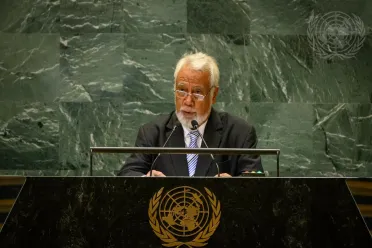Statement
Statement summary
KAY RALA XANANA GUSMÃO, Prime Minister of Timor-Leste, narrating how, post-independence, his country began a process of internal reconciliation amongst countrymen and with neighbouring Indonesia, he said reconciliation, being “a powerful mechanism for healing the past and building the future”, and trust are indispensable instruments of peace for the world today. Though the UN was founded on the basis of hope for achieving peace in all its dimensions and in all places, finding collective solutions to global challenges, and uniting international cooperation around these goals; “there has never been so much hopelessness, uncertainty, instability and distrust.” With six years to the SDGs target date, and being so far from achieving them, some countries have lost the race even before taking off. He reminded of how, with the Group of Seven Plus (G7+) countries, Timor-Leste proposed the inclusion of Goal 16 — Peace, Justice and Strong Institutions — in the 2030 Agenda, and emphasized their interconnectedness.
These countries, he continued, have a similar problem: lack of funding. However, while his country has made some progress, more still needs to be done as social and economic inequalities have been exacerbated by overlapping crises, with hunger being “the most illustrative face of inequality”. And because more than 800 million people suffer from extreme hunger worldwide, Timor-Leste is diversifying its economy, emphasizing agriculture and the blue economy. “By investing in these sectors, we aim to improve the livelihood of our people and enhance food security,” he stressed. Announcing his country’s ratification of the Conservation and Sustainable Use of Marine Biological Diversity of Areas beyond National Jurisdiction Agreement under the United Nations Convention on the Law of the Sea, he committed to full support of and active participation in negotiations on the Marine Plastics Treaty. Timor-Leste will also sustainably explore its ocean resources to develop the country, while protecting the marine ecosystem for future generations.
As small island developing States and least developed countries are enormously challenged in achieving the SDGs, they cannot fare better without improved financial conditions, capacity-building and technology transfer. “We are trapped in international financial systems that place us disadvantaged, burdening us with conditional aid, financial assistance and debt,” he lamented, urgently calling for the Loss and Damage Fund, approved at COP28 in Dubai, to secure more significant contributions from wealthy and developed countries. Echoing the UN Secretary-General, he said “many of us won the battle against colonialism and the struggle for democracy, but we are still fighting for sustainable development”. In the Secretary-General’s “New Agenda for Peace”, the UN chief notes that the unequal suffering caused by the effects of climate change is among the greatest injustices in this world. “Timor-Leste agrees!” he said, adding: “We all know that we can only win this battle with genuine global solidarity and effort.”
He regretted the proliferation of conflicts and wars despite global possession of instruments of international law, diplomacy and multilateral cooperation for peaceful dispute resolution, which are not applied consistently and are often ignored. He therefore called for “the peaceful resolution of international disputes and conflicts, whether related to borders, sovereignty or cooperation” and demanded the implementation of relevant Security Council resolutions towards a referendum for self-determination for Western Sahara. The conflicts in Gaza and Ukraine should immediately cease, with the UN Charter applied courageously. He further called for long-term, comprehensive reform of the Security Council “as only then will we have a solid and transparent architecture for global peace”.

